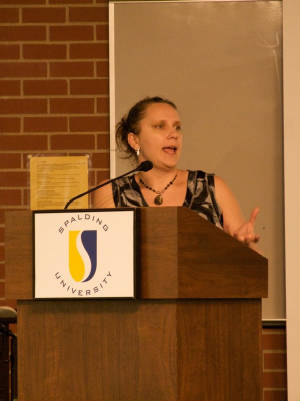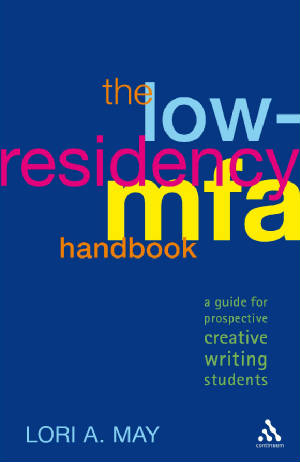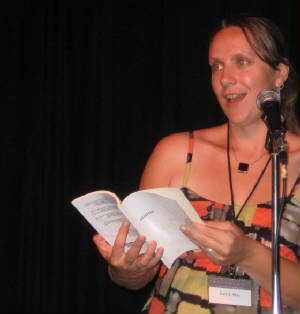|

Lori A. May is the author of four books, including stains: early poems and The Low-Residency
MFA Handbook: A Guide for Prospective Creative Writing Students. Her work has appeared in publications such as The
Writer, Rattle, Two Review, Writer's Digest, and anthologies such as Van Gogh's Ear. She is a part-time writing
instructor and a frequent guest at writers' conferences and graduate programs. Lori is also the founding editor of Poets'
Quarterly and an associate editor with Northern Poetry Review. A native of Canada, Lori now lives and writes on
the shores of Michigan.
The Smoking Poet: Welcome to The Smoking Poet, Lori! You are a writer of tremendous range, and so we would like to
begin our talk with you by asking about that range … you write poetry, prose, nonfiction, and you also instruct other
writers and offer workshops and seminars. You are also editor, or have been an editor, for numerous literary publications
and publishers. Did you set out to be such a diverse writer? Or is that something that you find necessary to making a living
as a writer, to be this diverse?
Lori A. May: Thanks for having me,
Zinta, and thank you for your kind words. You know, I think most writers are multi-taskers by nature, whether that diversity
is played out in the literary world or across the disciplines. If we’re not working a 9-to-5 job, we’re managing
families and other life responsibilities, so multi-tasking just comes with the territory. I wouldn’t say I deliberately
set out to work in so many literary venues, but I do consider myself community-oriented and I have a tendency to get involved.
When opportunities come along, I have a hard time saying no but that’s what has led me to work with so many great people
over the years. First and foremost, I focus on my writing but I always try to be open to new opportunities, whether that’s
editing or teaching. It’s made for a very satisfying, well-rounded writing life. I don’t think I could have planned
it as such, but I’m grateful for the experiences I’ve had and the doors that have opened for me.
TSP: Do you have a preference for any
one genre? Or does an idea or mood simply seem to fit one over the other? Do you see yourself as stronger in one than another?
Do you ever take the same seed of an idea and plant it into more than one genre?
Lori: Poetry has been the longest lasting
medium for me and no matter which genre I seem to be focused on at any given moment, poetry is always my heart and soul, the
work I do on an almost daily basis. That being said, I have had years where I worked harder to develop my fiction, or worked
diligently to develop my nonfiction freelance work, so I do shift attention from time to time. For fiction, I really do have
to be in the mood for it and have something I feel strongly about pursuing, so I don’t write fiction as often. I have
to be in that zone, if you will, since it is such a commitment. I would say my time is predominantly spread between nonfiction
and poetry, with poetry acting as the backbone that keeps it all together. Poetry keeps me sane. I have, however, written
a poem and thought how the premise might develop into a prose piece; so, yes, I do sometimes crossover an idea within the
genres.

|
| Lori as guest lecturer, Spalding University, 2010 |
TSP: Many writers dream of being full-time
freelancers. Please share with us how you accomplished this. Was it a gradual process or did you leap off that cliff in one
fell swoop? What makes a successful freelancer?
Lori: There really are two definitions
here that are completely subjective and will mean different things to different people: freelance and success. What I mean
by that is that there is a highly personalized definition of what success is: for one writer it may mean regular publication
and for another that may have a more specific monetary price tag, or specific annual income, attached to the definition. I
gradually added more freelancing to my portfolio as opportunities came along and some of those opportunities are not what
some might think of as traditional ‘freelancing,’ such as editing or teaching. But all of the little ‘odd
jobs’ like journal editing, conference presentations, workshop instruction, and article writing add up to make a full-time
job. For me, I gradually added these elements to my writing life as opportunity came along – or as I created opportunity
for myself – and eventually these took the place of other non-writing jobs. That being said, it’s an individual
choice of what constitutes full-time writing work. Obviously, someone who needs to support a family of six may define freelance
success in different terms than I do, but I’m lucky in that I don’t have to focus on the monetary value of my
work so much, being that I have a small family that does not solely depend on my income. So long as I am doing what I love
and others value my contributions, I’m happy. A big part of that happiness is diversifying what I get involved in and
how I interact with the community. If I feel involved, I feel successful.
TSP: You have said that the success
of your first novel, The Profiler, in 2005 led to the release of your second novel, Moving Target, in 2008.
Does that mean you might have abandoned writing novels had that not been the case? How important are publication and sales
to a writer? Aside from the financial aspect, of course. What is your driving motivation and inspiration?
Lori: My second published novel really
did result from the success of the first, in that my editor was quite eager for me to have another novel fairly soon afterward.
That being said, those two novels are in a genre I am not really drawn to as much right now, so despite their sales success
it’s not a path I’m following for the foreseeable future. So, I suppose sales aren’t as important to me,
or at least not the driving force behind writing something. Of course I want my books to sell, but I also have to feel wholeheartedly
behind what I’m writing and publishing. Perhaps when I was younger, the idea of selling a lot of books was more important
to me. Now, though, I am more driven by the art of storytelling and improving my craft than whether something will sell, I
suppose. If I am not happy with my work, readers will see through that. If I’m happy, readers are happy, and sales come
along in stride.
TSP: Tell us something about your writing
process. Does it differ depending on the chosen genre?
Lori: Across the genres, I do like
to have an idea, or at an outline, of where I am going. Even in poetry, I like to know a general theme or approach, particularly
if I am working on a book-length collection. However, I don’t like to plan too much as it takes the joy of discovery
away and I like to be surprised every day. I like having those ‘a-ha!’ moments when writing prose, or to see something
organically arise in poetry. I suppose I like to know that I plan on getting from A to B, but I don’t necessarily like
planning the route in between. So, I just make my morning coffee, sit down at the desk, and let the writing day unfold naturally.
I might set word count or page goals, but I try not to plan too much. I don’t want to get in my own way.
TSP: You’ve been managing editor
for Marick Press. This is a very high quality publisher, by the way … we’ve featured book reviews and one of your
poets, Derick Burleson, in previous issues. How does being an editor differ in your perspective on good writing from being
the writer? Does one bring added perspective to the other? Has being an editor perhaps made you a better writer (or a better
proposal and query writer)… or simply a more patient one because you know what goes on behind the scenes?
Lori: I’ve definitely learned
the art of patience thanks to working with various journals and publishers. When you see the incredible work being done behind-the-scenes,
and not all of it is actual editing, it’s completely overwhelming to consider how much work it actually takes to run
a press, big or small. It’s easy for us writers to think of editors as, well, editing our work and reading submissions.
Yet there is so much more that is required by a usually very small – and often volunteer – staff. Publishing,
as much as we like to forget, is a business. So, editors are consumed not only with submissions, but publication schedules
and printing orders, design elements and cover artists, business taxes and reports, organizational and board meetings, community
activities and fundraising… the list goes on. So, I thank my involvement with so many great literary groups for giving
me the chance to see how hard these folks work and to help me be a bit more patient when waiting on a submission response.
Editors get involved because they are passionate about what they do; they mean well and aim to get back to us about our work
in as timely fashion as possible. I know it doesn’t always feel like that, but there really is a whole world of work
behind the scenes that is important for writers to understand and appreciate. I wouldn’t say this knowledge has made
me a better writer, but it’s made me more compassionate to the time constraints and multi-tasking demands on editors.

TSP: Another one of your projects is
The Ambassador Poetry Project. Please tell us more about this, what motivated you, what niche you may have felt needed to be filled … and what your
experiences have been with it so far?
Lori: Editing The Ambassador Poetry
Project has been such an incredible experience, for many of the reasons I touched on above. There is so much value for writers
to learn the various roles of editing and publishing and to do so with a regional publication has been extra special. I’ve
lived in Michigan for about two years now, but prior to that I lived in Ontario. Even before my move, I was aware of how closely
our two regions are related when it comes to literary work, as there seems to be something unique about being centered in
the Great Lakes. Perhaps it’s our relation to the water or the land, or the often-crossed borders, but I thought it
was worth exploring and I knew other writers would enjoy bridging this relationship as well. It’s been a lovely journey
to date and we publish about four times a year, focusing exclusively on poetry from or about Michigan and Ontario. The wonderful
bonus has been seeing submissions from other states, from authors who regularly visit or used to live here, sharing their
work. Submissions are open year round and guidelines are online at www.AmbassadorPoetry.com.
TSP: Does place, environment, produce
a different kind of writer? Since The Ambassador Poetry Project centers on a certain location (Michigan) … have you
found this to be true and, if so, in what way?
Lori: I definitely think place plays
an important role in writing, even if unintentionally. I travel often and always make it a point to pick up work from local
authors. Writers working out of the Rockies, for example, have a common gene, as do writers from the Pacific Coast. I don’t
mean to generalize and say region defines us, but readers will sense something unique about each geographic and literary place
and that’s what makes us special. It may not always be clearly defined or include specific references to locales within
the writing itself, but there’s an underlying tone or perhaps an aura to a piece that comes from one place over another.
Maybe it’s that intangible quality that attracts us, since it is so difficult to define. At any rate, it’s something
I wanted to explore with The Ambassador Poetry Project and I think the work that has come in from Michigan and Ontario is
demonstrative of how regionalism can play a role, even when not centered on ‘place’ within the work itself.
TSP: Speaking as an editor, go ahead,
dish it out … what are your pet peeves? What do you wish writers could understand about submitting their work to you
or any other editor?
Lori: It’s not a pet peeve, but
something I think writers – including myself – need to be reminded of, from time to time: rejections really aren’t
meant to be personal. In my experience of being ‘on the other side’ of the submission process, it has become more
and more clear that sometimes a submission is really, truly great as far as the work goes, but... for some reason, just doesn’t
fit the editorial needs, or at least not at that present moment. That’s so hard to define, which is why it’s difficult
for editors to give more details than that, and why it’s tough for writers to understand. As writers, we want to improve;
we want success; so it’s tough not knowing why something doesn’t work. As a writer, this awareness from the editorial
side has definitely improved my own response to rejection. Now, rather than beating myself up and wondering why, I move on
and submit my work elsewhere. There are so many print and online journals; I think it’s every writer’s job to
just keep submitting with the faith that his or her work will find a suitable home. It takes time and patience, but we all
know perseverance plays a big role in writing!
TSP: Your first non-fiction book is
being published in January 2011. Tell us about The Low-Residency MFA Handbook: A Guide for Prospective Creative Writing
Students. Again, was there a need out there you are trying to fill, and what does this book offer creative writing students
that they may not find elsewhere?
Lori: I’m so excited about this
book! The Low-Residency MFA Handbook really does fill a need, too. There are some wonderful MFA resources out there
right now, like Tom Kealey’s MFA Handbook and the “Official Guide to Writing Programs” produced by
the Association of Writers and Writing Programs (AWP). Yet there seemed to me to be a lack of resources available for prospective
students looking into low-residency MFA programs. Low-res programs are unique, in that students only attend campus for a few
weeks each year, while the remainder of the program takes place under the guidance and mentorship of instructors as the student
writes and completes assignments from home. This model of study is steadily increasing. I knew from chatting with prospective
students, and faculty alike, there needed to be a specific resource for those looking at low-res programs and I had such a
wonderful time writing this book. In it, prospective students will ‘meet’ more than 150 directors, instructors,
alumni, and current students of low-res programs, as the book is grounded with one-on-one conversations that reveal so much
more than a program overview. The interviewees share tips and ideas for students to make the most of their MFA experience
while also exploring the possibilities within each institution: program tracts, editorships, assistantships, alumni conferences,
etc. I hope The Low-Residency MFA Handbook proves useful to prospective students researching programs, while also sharing
some ideas on how to make the most of the MFA after graduation, when making that transition from student to independent
writer.

|
| Kentucky Women's Writers Conference, 2009 |
TSP: And then there’s poetry.
What do you express in poetry that you express nowhere else and in no other way?
Lori: Poetry allows me to play with
language in such a way that’s unique from other forms. I’m addicted to playing with line breaks and creating multiple
meanings with the same set of words, or finding a few words that either work so well together or cause an intentional collision
where you simply have to start over to let them sink in, for their unexpected relationship. I do enjoy prose, but I find poetry
to be so much more freeing, whether that’s exploring a heavy subject in a few short lines or adopting a persona to explore
living in someone else’s brain for a moment. Not all of my poetry is a result of my own life experiences, so oftentimes
my speaker is not from me, personally, but from something I have observed or heard and explored for its freshness. I think
one of poetry’s greatest joys is how we, as readers, can absorb the words and apply them to our own life, or to our
own perspectives, and come out with differing takes.
TSP: In some of your workshops and
seminars, you talk about social media for writers. What should writers know about social media? Is it important to have an
online presence? Is one venue (Facebook, Twitter, a Web site, blogs, ezines) more important than another … or should
a writer try to touch on all bases?
Lori: Now more than ever it’s
critical for writers to have some form of online presence. Really, it’s an opportunity that is available to us –
usually for free – that we should take advantage of for so many reasons, and not just to promote our work. As I mention
in my workshops, I have had the great fortune of meeting some wonderful peers online; the ability to meet and connect with
like-minded writers across the country – the world – is amazing. I have made genuine ‘real-life’ friendships
that have developed from the seeds of meeting online; I have met editors through casual online conversations that have later
led to work or publication. Social media opens doors for us, but we need to be proactive in interacting with the community.
The one thing I think is most important for writers to remember is that social media is about being social and networking;
yes, we hope to promote our work and ourselves as writers, but if we don’t authentically engage with others as real
people, in a real writing community, we’ll miss out on developing authentic relationships – and we need those
relationships. Writing is solitary enough on its own; it’s so nice to have those online friends to turn to for laughter,
hugs after rejection, cheering squads for sending out submissions. The author dot com is where writers can focus on promoting
and marketing their work, but Facebook, Twitter, and author blogs should be more focused on interaction within a community.
Social media is a two-way conversation, so it’s valuable for a writer to decide how much she or he can commit and find
one or two sites to regularly participate in and focus energies there.
TSP: How is writing for the Web different
than writing for hard print? Is there a difference? Or do you think we are moving more toward “flash” pieces,
the quick and dirty, rather than the traditional short stories, where one settles in for a long evening for a longer read
…
Lori: It may seem like we’re
losing our attention spans, but I think the Web is actually increasing our reading. Yes, many online journals tend to favor
shorter pieces, but there is an equal number seeking to push boundaries free from what the page can hold. I recently attended
a publishing symposium at University of Michigan in which Tung-Hui Hu, an assistant professor and a poet, made some great
comments about how the Internet allows us to put extensive works out there in ways the page may hold us back. For example,
he talked about the ability to publish scrolling poems or chapbooks that carry on in sequence well beyond what we may typically
see in print – and with a worldwide audience. I do think white space is important when reading online; our eyes need
the visual breaks. But it’s also interesting to see how some journals, like qarrtsiluni.com, are finding unique ways
to present work, by including audio readings, as well. There’s a lot we can do online and we’re only just tapping
into the various ways we can use the Internet to share work with audiences in fresh, unexpected mediums.
TSP: Finally, we can’t resist plugging
our own wonderful selves. You will be one of our esteemed guests at “Puttin’ On The Dog: TSP Celebrates 5.” That’s our fifth anniversary celebration on April 28, 2011, at The Wine Loft in Kalamazoo, Michigan. With such
a diverse background, tantalize our audience a bit … what can we expect from a Lori A. May reading that we may not get
on the written page?
Lori: Ha! Well, I talk a lot during
a reading. Sometimes it feels like I do more impromptu storytelling than actual reading, but I’m often told how the
audience enjoys this, too. It’s just my way of connecting with the live audience in front of me. I’m really looking
forward to Puttin’ On The Dog and plan on sharing some poems from a collection I recently completed, Forgiveness,
and from a collection I am working on right now, Square Feet. The audience will hear a few poems, but I’m sure
I’ll share a little about their creation and my process, strange road trip discoveries that led to inspiration, probably
a few jabs at my Canadian-meets-Michigan accent, and some overall poetic rambling. I’m thrilled to be a part of The
Smoking Poet's 5th anniversary event and look forward to celebrating with everyone.
TSP: Thank you so much, Lori, for your
time and shared wisdom. Where can writers and readers learn more about you and
your work?
Lori: Thanks for having me, Zinta.
My home page on the Web is www.loriamay.com and there you will find the latest news and upcoming events, links to publications and journals, and a sampling of poems
in print and audio form. My blog and social media sites are linked directly from my website, as well.
The Smoking Poet has reprinted our review of stains in this issue.
Read samples of Lori A. May's poetry.
|

